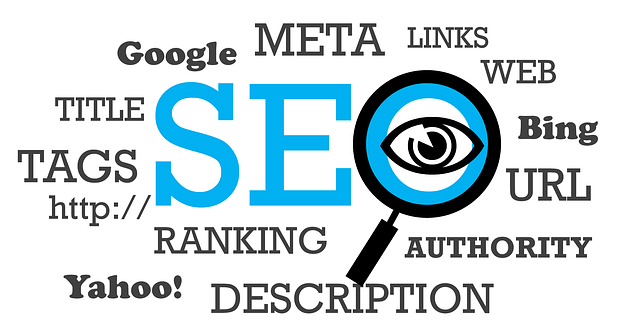Search Engine Optimization (SEO) is a strategic process that boosts website visibility and ranking by understanding user intent, creating valuable content, and optimizing for search engines like Google. Key steps include keyword research to identify target audience needs, on-page optimization for user-friendly experiences, building high-quality backlinks from reputable sources, site speed and structure improvements, schema markup, mobile responsiveness, and regular content creation and updates. Measuring performance with tools like Google Search Console and Analytics is crucial for refining strategies. By implementing SEO Tips for Ranking Higher, businesses can enhance search visibility, attract qualified leads, and drive sales through digital channels.
Looking to boost your online visibility and attract more traffic? This guide offers essential SEO Tips for Ranking Higher. We’ll explore key strategies, from understanding the fundamentals of Search Engine Optimization (SEO) and its profound impact on search rankings, to leveraging powerful tools like keyword research and high-quality backlinks. Discover how optimizing on-page elements, focusing on user experience, and implementing effective content creation can propel your website to the top of search results.
Understanding Search Engine Optimization (SEO) and its Impact on Visibility

Search Engine Optimization (SEO) is a strategic process that involves optimizing websites and content to enhance their visibility and ranking in search engine results pages (SERPs). It’s more than just a set of techniques; it’s an art and science combined, aiming to bridge the gap between what users search for and what they find. By understanding user intent behind queries and aligning website content with these intents, SEO tips for ranking higher become invaluable tools.
SEO tips aren’t just about manipulating algorithms; they’re about providing value to your audience. When you implement effective SEO strategies, you ensure that your website appears more relevant and trustworthy in the eyes of search engines like Google. This translates into increased organic traffic, improved user engagement, and ultimately, better business outcomes. By following SEO tips for ranking higher, you can make your content more discoverable, driving more qualified leads and sales through digital channels.
Keyword Research: The Foundation of Effective SEO Strategies

Keyword research forms the very foundation of any successful SEO strategy, serving as the cornerstone upon which your entire campaign rests. It involves a deep dive into understanding your target audience and their search behaviors by identifying relevant keywords that potential customers are using to find products or services similar to yours. These keywords become the building blocks for crafting compelling content that resonates with your audience and satisfies their information needs.
By employing effective keyword research techniques, you can uncover valuable insights into user intent, search volume trends, and competitive analysis. This knowledge allows you to strategically position your website and content to rank higher in search engine results pages (SERPs). SEO tips for ranking higher emphasize the importance of selecting keywords with careful consideration, ensuring they align closely with your offerings and target audience’s queries.
Optimizing On-Page Elements for Higher Rankings

When it comes to SEO tips for ranking higher, optimizing on-page elements is a crucial step. This involves enhancing various aspects of your web page content to make it more relevant and attractive to search engines. Start by conducting thorough keyword research to identify the terms your target audience uses when searching for products or services similar to yours. Incorporate these keywords naturally into your titles, headings, meta descriptions, and throughout your content without excessive use, as this can negatively impact readability.
Additionally, focus on creating high-quality, engaging content that provides value to your readers. Search engines prioritize content that is informative, well-structured, and up-to-date. Ensure your pages have clear and concise titles, relevant headings (H1, H2, etc.), and a logical flow of information. Optimize images with alt tags and ensure your website is mobile-friendly as search engine algorithms favor responsive design, leading to improved user experience.
Building High-Quality Backlinks: A Powerful SEO Tool

Building high-quality backlinks is a cornerstone of effective SEO strategies, serving as a powerful tool to significantly enhance your site’s visibility and ranking potential. These backlinks act as votes of confidence from other reputable websites, signaling to search engines that your content is valuable and trustworthy. When incorporating SEO tips for ranking higher, focus on acquiring links from authoritative sources within your industry or niche. This could include guest blogging on popular industry blogs, creating informative infographics, or offering unique, high-value resources that other sites are eager to link to.
Quality matters more than quantity when it comes to backlinks. Instead of chasing a large number of low-quality links, strive for a smaller but carefully curated set of backlinks from well-regarded websites. This not only bolsters your search engine rankings but also drives targeted traffic to your site, ultimately leading to increased engagement and conversions. Remember, building high-quality backlinks is an ongoing process that requires consistent effort, strategic planning, and the creation of content that naturally attracts links from other relevant online platforms.
Technical SEO Considerations for Seamless User Experience

To ensure your website offers a seamless user experience, consider several Technical SEO tips that directly impact search visibility and your ability to rank higher. One key aspect is optimizing site speed. Google prioritizes fast-loading pages, so compressing images, leveraging browser caching, and minimizing HTTP requests can significantly improve page load times. Additionally, ensuring proper schema markup implementation helps search engines understand your content better, leading to more accurate results display.
Mobile responsiveness is another crucial element. With most users accessing the web via mobile devices, a responsive design ensures your site adapts gracefully to different screen sizes, providing an intuitive user experience regardless of the device type. Moreover, creating a clean and organized site structure with easy-to-understand URLs enhances crawlability, enabling search engine bots to navigate your pages efficiently. These technical optimizations not only contribute to better SEO but also foster a positive user perception, encouraging visitors to explore more of your content.
Content Creation and Strategy for Long-Term Success

Creating content that ranks high in search engines requires a strategic approach tailored for long-term success. Focus on producing valuable, relevant, and unique content that resonates with your target audience. Keyword research is key; identify terms and phrases your audience uses to search for solutions related to your niche. Integrate these SEO tips for ranking higher by naturally incorporating keywords into your headlines, subheadings, and body text without overwhelming readability.
A solid content strategy should also involve consistent publishing, diversifying formats (e.g., blog posts, videos, infographics), and promoting content through social media and email campaigns. Regularly updating existing content with fresh insights ensures its longevity and relevance, boosting its chances of securing a higher search ranking over time.
Measuring and Analyzing SEO Performance: Tools and Techniques

Measuring and analyzing SEO performance is a crucial step in any search visibility strategy, offering valuable insights to refine and improve your approach. A variety of tools and techniques are at your disposal to track your website’s progress and understand how users interact with your content. Google Search Console and Google Analytics are essential allies here; the former provides data on keywords, clicks, impressions, and average position, while the latter delves deeper into user behavior, including bounce rates, pages per session, and time spent on site. These insights can highlight areas for optimization, such as targeting specific keywords more aggressively or refining content to better meet user expectations.
Additionally, leveraging SEO tools like Ahrefs, SEMrush, and Moz can offer comprehensive overviews of your website’s health and performance compared to competitors. These platforms provide in-depth keyword research capabilities, backlink analysis, and on-page optimization suggestions. By combining data from these sources, you can craft a refined SEO strategy that focuses on high-value keywords and ensures your site is optimized for both search engines and users. Remember, consistent monitoring and adjustment based on data are key to ranking higher and maintaining strong search visibility over time.
